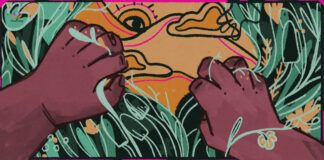How My Great Aunt and Uncle Supported Black Power and Exposed...
Wesley Bellanca reflects on his great aunt and uncle who supported the Black Panthers and exposed the CIA in the 60s. He interviews their daughter and he explores the overlap between the psychedelic revolution and political movement of the 60s. In doing so, he gains a deeper understanding of the civil rights movement.
Rediscovering Our Ancestral Roots of Exploration
In this beautifully articulated personal essay, Joseph McCowan reflects on his ancestral roots as a Black person in the United States and the historical relationship with the land, sacred plants, and the psychedelic renaissance. He describes a future of liberation and breaking of the oppressive chains that have confined Black people for centuries.
Missing in Action: Where are all the White Allies?
This article thoroughly defines the concept of White allyship and presents misconceptions and issues surrounding this concept. In looking through many research articles, Dana Strauss explains why White allies have been less present and explores steps that folks can take to become racial justice allies in this pivotal moment in history.
Real Reciprocity: The People Who Brought You Sacred Plant Medicine Need...
This speech, originally given by Artionka Capiberibe, Ph.D at Chacruna’s Religion and Psychedelics forum, takes a step away from the focus on sacred plants and emphasizes many struggles faced by Indigenous communities, particularly those in Brazil. It is important to educate ourselves on these issues in order to support Indigenous communities whose populations continue to suffer over time.
Indigenous Reciprocity Initiative of the Americas: A Respectful Path Forward for...
While psychedelics become a part of the mainstream, many problems arise that negatively affect Indigenous peoples that have been using these plant medicines for thousands of years. Chacruna’s Indigenous Reciprocity Initiative is one way ensure that these Indigenous communities are supported financially and by providing education to non-Indigenous folks entering this booming field on the concept of reciprocity.
Introduction: Creating Intellectual Property, Creating Americans
This introduction from Anjali Vats’ book, The Color of Creatorship, gives a brief overview of how intellectual property law continues to be shaped around whiteness and colonialist ideals. She discusses the issues of race and lack of diversity that are present when looking at intellectual property laws and opens up the conversation for people to confront and discuss unjust racial hierarchies.
Psychedelics, the War on Drugs, and Violence in Latin America
This article exposes the dark realities of the commercialization and globalization of substances. Indigenous communities in Latinoamerica face an increasing struggle to rightfully access natural resources due to the fight for territory between illicit drug traffickers. Many Indigenous people have lost their lives, and the media has done little to talk about these issues. Diana Negrin gives examples and also explains parallels between these issues and substance problems faced in the U.S.
Chacruna Debunks 6 Racist Myths from the Psychedelic Community
Dr. Monnica Williams, Dr. Darron Smith, Dr. NiCole Buchanan, and Cristie Strongman, members of Chacruna’s Racial Equity and Access Committee and leading researchers and...
Mazatec Shamanic Knowledge and Psilocybin Mushrooms
The roots of Mazatec shamanism, widely recognized for ritual use of psilocybin mushrooms, extend to the ancient Mesoamerican tradition.
Educating Gringos in Shipibo Ways
In this personal account, Reilly Capps recounts his experience doing Ayahuasca and the way he grappled with understanding Shipibo wisdom through a White American lens. When reading the book Ayahuasca Healing and Science, he came across an interview between Bia Labate and Adam Andros Aronovich which shifted his understanding of Shipibo knowledge.














